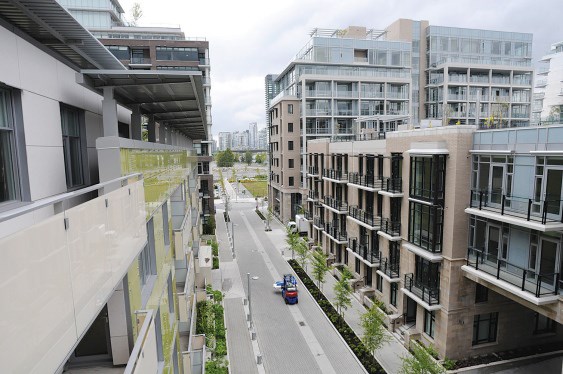The City of Vancouver says it paid off the entire $630 million debt for the troubled Olympic Village project after selling 67 remaining condominium units for $91 million to the owners of the Vancouver Canucks.
Mayor Gregor Robertson told reporters Monday the Aquilini Group’s purchase of the condos ends the city’s involvement in the project that he once referred to as a $1.1-billion boondoggle.
“It’s a very good day for the City of Vancouver, in particular for city taxpayers,” said Robertson at a press conference at city hall. “Today, I’m thrilled to announce that we at city hall here have delivered gold for the taxpayers on our Olympic Village.”
Though the mayor framed the news as an Olympic-sized achievement, a later briefing by city manager Penny Ballem revealed the original revenue projections for the $1.1-billion project fell short by $130 million.
Originally, developer Millennium Properties Ltd. agreed in a 2006 deal with the city to pay $200 million for the land. The city only received $70 million. That $200 million was to be used to help build infrastructure such as roads, walkways and amenities including parks and a community centre for the Village and two large properties on both sides of the Southeast False Creek lands.
“There’s no question, that if we had got $200 million, that would have been more money to the city to cover more extensive parts of the infrastructure,” said Ballem, who couldn’t definitively say how or who will pay for infrastructure costs associated to the Village’s neighbouring properties. “We haven’t done all the analysis yet.”
That $200 million land value projection, along with the city acquiring a $690 million loan ($60 million of which came from city coffers) and another $200 million in condo pre-sales from Millennium added up to $1.1 billion. The city ended up getting the $200 million in pre-sales in August 2010 and later made $411 million by selling off more condos and commercial space. The city also collected $68 million from 32 various properties turned over from Millennium and, finally, sold the 67 remaining condo units for $91 million to the Aquilinis.
That added up to $770 million, which gave the city enough money to pay off the $690 million loan and put $70 million towards some of the infrastructure and amenities on and around the Village property.
“It’s really, honestly, monumental,” Ballem said of the city’s ability to pay off the debt, which the city inherited seven years ago.
The controversy around the project dates back to a 2007 in-camera meeting at city hall when the then-NPA dominated council voted in favour of a $190 million financial guarantee in a complex three-way agreement involving the City, Millennium and New York-based lender Fortress Investment Group.
Vancouver councillors, including four from Vision Vancouver, agreed to a “completion guarantee” on the loan to Fortress, effectively making the City the project’s developer and putting taxpayers on the hook for the tab.
NPA Coun. George Affleck, who also attended the mayor’s press conference, said Robertson and his Vision Vancouver party cannot take credit for the debt being paid off. Affleck was elected in 2011 and not part of the council that agreed to bail out Millennium.
“This was done by a receiver and a real estate company,” he said, referring to Ernst and Young, which took over management of the Village in November 2010, and Rennie Marketing Systems. “We were hands off. We merely oversaw the process. So for Vision and the mayor to take credit and say we had good business sense has nothing to do with this process. It’s simply the receiver that did the good work.”



